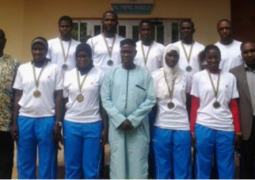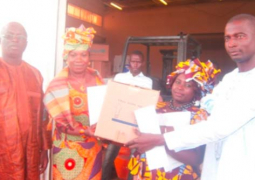
The
Director General of the National Agricultural Research Institute (NARI), who
doubles as acting Director General of ITC, Ansumana Jarjue, has disclosed that
NARI had shifted to a new paradigm dispensation in agricultural research, to
focus on delivering on a multi stakeholder’s platform on technology generation
and partnership strengthening as part of its mandate.
Mr Jarju made this statement during the NARI
multi-sectoral field visit to their farm site in Banjulinding.
The
three-hour visit was organised by the management of NARI and its board members and was attended by
various multi-sectoral stakeholders, including the Office of the President,
Ministry of Finance, Ministry of Environment, representative from NYSS,
Department of Agriculture, among others.
The
visit was meant for knowledge-sharing experiences, and delegates were taken to
various trial farms such as the NERICA farm, the Maize farm, the Findi among
other farm varieties.
According
to the NARI DG, the innovation platform food system approach looks at the
commodity value chain by employing inclusive multi-stakeholder’s partnership
approach to dialogue problems and design solutions that convert knowledge into
a socioeconomic outcome.
DG
Jarjue further stated that the interaction of the factors - economic, social,
political, organizational and institutional - is influencing the development,
diffusion, and use of innovation.
He
said their context was to bring researchers into partnership with extension
agents, farmers, inputs dealers, policymakers, private sector members and end
users to catalyze the innovation process.
According
to him, “the inclusive arrangement expands the input base” for the design of
agricultural researcher development agenda, thereby promoting chances of
adoption.
Hence,
the approach shortens the lag phase between the development of technologies and
their adoption thereby improving chances of development impacts.
Mr
Jarjue further indicated that change in paradigm might move from the
ineffective conventional approach emphasizing a linear relationship between
stakeholders, research-extension farmer model into a knowledge-based
multi-stakeholders agricultural system, such as integrated agricultural
research for development, as an innovation system.
He
said despite the considerable progress made by the new management, “there is
still a great deal to be done”.
“NARI
has generated several technologies with high potentials, but the impacts of the
technologies on farmers’ productivity, livelihood and quality of life have to
be consolidated,” he stated.
He
said among the key achievements of NARI, is the proposed releasing and adoption
of important varieties of major crops including rice, maize, millet and
sorghum.
These
have proven to be scientifically high yielding, early maturing, tolerance to
biotic and biotic stresses pest, disease, salinity, and iron toxicity, he
added.
He
said NARI, in collaboration with the Africa Rice Research Center, has developed
ASI (Rice) thresher to reduce the post-harvest loss and ensure the quality of
rice paddy after threshing.
Ten
local artisans have been trained to scale out the knowledge gained to young
Gambian entrepreneurs for self-development.
DG
Jarjue also said that in its efforts to ensure food safety in the country, NARI
conducted series of tests on quality assurance for imported and exported
agricultural products in the area of aflatoxin and other chemical analyses such
as free fatty acid, oil content, moisture content, and soluble and insoluble
impurities.



